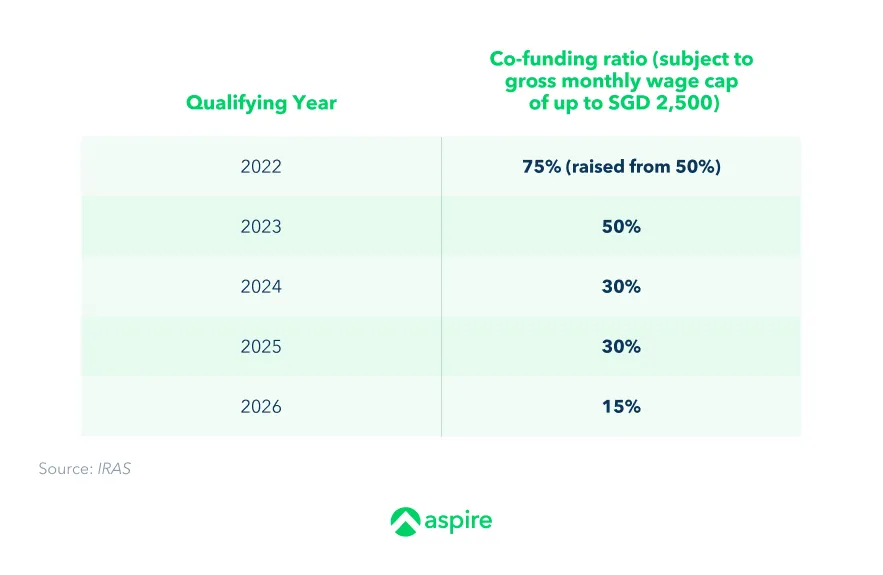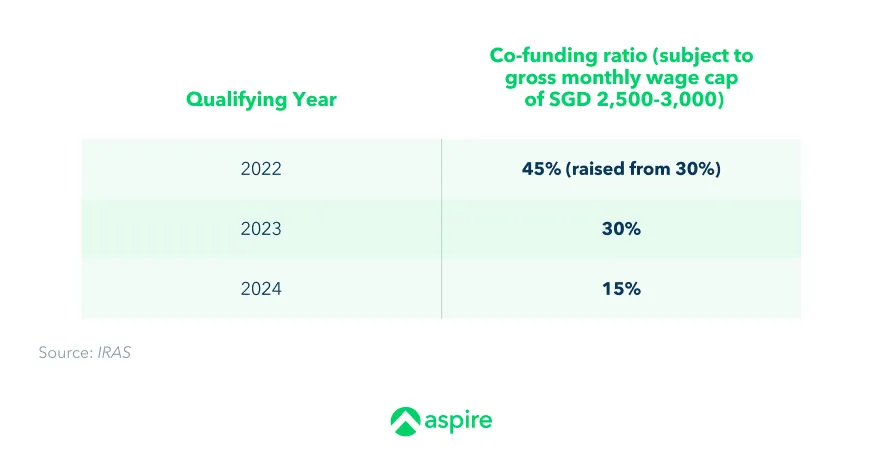Summary
It’s no secret that Singapore is an extremely pro-business environment, and corporate taxes have much to do with it. The country has one of the lowest corporate income tax rates at 17%. But a wide range of tax incentives and allowances help bring down corporate tax bills even further.
How to reduce income tax in Singapore? This article provides the answer to this question by listing out the key tax-saving schemes and instruments Singapore offers businesses.
Business and IPC Partnership Scheme
Singapore rewards organisations that give back to society. The Business and IPC Partnership Scheme (BIPS) is one such reward whereby companies who send staff to volunteer at or provide services to charities recognised as Institutions of a Public Character (IPCs) receive a 250% tax deduction on qualifying expenses. An IPC is a registered charity approved by the Commissioner of Charities to accept donations for which the donors receive a tax deduction in Singapore.
Qualifying expenses, which cover basic wages and other expenses, must:
- Be incurred only on providing services to IPCs
- Not be reimbursed by the IPCs
- Not be personal, living, or family expenses
- Not be capital expenditure (money spent on fixed assets such as land and property).
There is a cap on qualifying expenses, which is SGD 250,000 per Year of Assessment (YA).

Wages paid to part-time employees who volunteer are covered under BIPS. So are wages paid at a fixed hourly rate (instead of as salary). Hourly wage rates are SGD 10 for general volunteering (painting an IPC building’s wall) and SGD 20 for skills-based volunteering (providing medical services).
The scheme is open to most companies doing business in Singapore, even if they aren’t registered in the country. However, the following organisations are not eligible:
- Trusts, with the exception of business trusts
- Investment holding companies
- Non-resident companies that pay a final withholding tax
- Goods donated to IPCs aren’t covered either, unless the costs incurred on acquiring the goods occurs during the volunteering period.
There are three steps to claiming tax deduction in Singapore under BIPS:
- Before voluntary work: The company and IPC agree on the type, duration, and estimated cost of service to be provided. The company fills the BIPS Service Giving Form A and Declaration.
- After voluntary work: The company fills the BIPS Service Giving Form B with details of actual expenses. The IPC endorses Forms A and B and the Declaration and submits them to the Inland Revenue Authority of Singapore (IRAS) by January-end of the following year.
- During income tax return filing: The company claims BIPS tax deduction on the amount approved by the IPC in Form B.
Fraudulent deductions may be punished by a fine of up SGD 50,000, penalty of up to 400% of the amount of tax undercharged, and/or jail.
Double Tax Deduction Scheme for Internationalisation
Like with corporate volunteerism, Singapore incentivises global expansion of companies. The Double Tax Deduction Scheme for Internationalisation (DTDi) is administered by Enterprise Singapore (ESG), with the participation of the Singapore Tourism Board (STB). It offers companies a 200% Singapore tax deduction on nine qualifying expenses:
- Trips and missions for business development
- Investment study trips and missions
- International trade fairs
- ESG or STB-approved local trade fairs
- ESG-approved virtual trade fairs
- ESG-approved product/service certification
- Advertising and promotional campaigns
- Advertising in approved local trade publications
- Designing of packages for overseas markets.
Businesses can claim the tax deduction automatically (without ESG or STB approval) subject to an expenditure cap of SGD 150,000 per YA for costs incurred from YA 2019 to December 31, 2025. For expenses exceeding the cap or falling outside the nine areas, companies need to apply for ESG approval.
To qualify for the double tax deduction, beneficiary firms must:
- Reside in Singapore primarily to promote the sale of goods/services
- Promote new goods/services in new overseas markets while retaining existing customers
- Search for and identify potential new customers for existing goods/services.
Before starting an international market expansion project for which it plans to seek tax relief under the DTDi scheme, a company must submit an online application with the ESG, which might seek documents to verify the stated eligible expenses. For projects that receive approval, the company may then file an evaluation form with the government agency once the project is completed. The ESG will then endorse the tax relief claim through a Letter of Support. This Letter of Support must be attached to the company’s income tax returns to the IRAS.
Singapore Economic Development Board rewards
Just as it rewards resident companies with global ambitions, Singapore also offers tax breaks to foreign firms that set up headquarters in the country. It does so through two awards administered by the Singapore Economic Development Board.
1. Regional Headquarters Award
Companies that locate their Asia-Pacific headquarters in Singapore to carry out headquarter activities (management, coordination, and control of business operations) are eligible for the Regional Headquarters Award (RHA). Under it, companies pay a reduced 15% tax on income from headquarter activities for three years, extendable by another two years provided they fulfil the following minimum requirements by the end of the third year:
- Maintain SGD 200,000 in paid-up capital by the end of the first year and SGD 500,000 by the end of the third year
- Provide a minimum three headquarter services to three company-owned entities (branch, subsidiary, franchise, etc) in three foreign countries
- Employ at least 75% of skilled staff (high school graduates)
- Hire 10 professionals (diploma holders) in Singapore
- Pay the top five executives an average annual salary of SGD 100,000 per person
- Spend an additional SGD 2 million in annual total business spending in Singapore. (Total business spending is total operating cost minus cost of raw materials, components, packaging, overseas royalties, work subcontracted outside the country).
2. International Headquarters Award
Companies that base their global headquarters in Singapore and commit to exceeding the minimum requirements for RHA qualify for an even lower tax rate of 5% to 10% under the International Headquarters Award (IHA). Eligible companies must be registered or incorporated in Singapore.
For foreign companies to set up regional and/or international headquarters in Singapore, they must meet these conditions:
- Move a significant number of headquarter operations to Singapore, including marketing control and brand management, research and development, general management and administration, intellectual property (IP) management, and corporate training, among others.
- Base staff running the headquarter operations in Singapore itself.
- Be a company recognised in its field of operation.
- Have strong HR, assets, capital, and market share capacity.
Progressive Wage Credit Scheme
The Progressive Wage Credit Scheme (PWCS) was introduced in Budget 2022 to support companies as they gear up for government-sanctioned pay hikes for local (Singaporean and/or permanent resident) lower-wage workers. The scheme kicks off in the second half of the year and is set to run till 2026.

Under PWCS, the government will co-fund 50% of pay hikes for eligible employees earning a gross monthly wage of up to SGD 2,500. Gross monthly wage is total wages (basic salary plus other payments such as bonuses, overtime pay, etc) earned by an employee in a calendar year divided by the number of months for which the employer makes central provident fund (CPF) contributions. The co-funding ratio will be tapered down in the following years.
However, as part of a special SGD 1.5 package to help businesses battle rising inflation, Singapore announced on June 21, 2022, that the government will be increasing its co-funding share under PWCS for this year. The co-funding ratio will be raised from 50% to 75% for employees in the below SGD 2,500 wage category and from 30% to 45% in the SGD 2,500-SGD 3,000 wage category.
PWCS Tier 1 co-funding ratios
For employees who earn between SGD 2,500 and SGD 3,000 a month, a lower co-funding ratio will apply and the scheme will run from 2022 to 2024.

For employees who earn between SGD 2,500 and SGD 3,000 a month, a lower co-funding ratio will apply and the scheme will run from 2022 to 2024.
PWCS Tier 2 co-funding ratios

Employers can qualify for this new wages credit scheme only if they hike gross monthly wage by at least SGD 100 in a year. Their employees must have been on the company’s rolls for three months in the qualifying year (any year between 2022 and 2026) and have received CPF contributions for three months in the year preceding the qualifying year. The scheme doesn’t cover businesses that aren’t registered in Singapore, local government agencies, international organisations, trade offices, and foreign missions.
Companies will receive the credit in the first quarter of the year following the qualifying year. For 2022, payouts will thus be made in the first quarter of 2023.
The formula to compute the total annual wage credit under PWCS is –
Co-funding ratio x qualifying wage increase x number of months of CPF contributions
The payout is automatic and the employer doesn’t need to submit an application to the IRAS. However, the credit is taxable as is the case for most government grants/payouts that are revenue in nature.
The PWCS is modelled on the Wage Credit Scheme (WCS), which ran from 2013 to 2021. Its aim was to help businesses cope with rising labour costs and free up resources so these could be invested and the gains shared with employees. The WCS initially co-funded 40% of wage increases to local employees earning a gross monthly wage of up to SGD 4,000. The co-funding ratio later fell to 15% while the monthly gross wage was capped at SGD 5,000.
Similar to PWCS, Singapore offers other wages credit schemes:
Jobs Growth Incentive (JGI)
Valid from September 2020 to September 2022, it encourages employers to hire local talent. The co-funding ratio for non-mature workers (less than 40 years) ranges from 15% to 40% and the gross monthly wage cap is between SGD 5,000 and SGD 6,000. The scheme is split into four six-month phases and is now in its fourth phase (April 2022 to September 2022). For this phase, the co-funding ratio is 40% and the wage cap SGD 6,000. For mature workers (40 and above), persons with disabilities, and former offenders, the co-funding ratio ranges from 20% to 40% and gross monthly wage is capped at SGD 5,000 to SGD 6,000. In the current phase, employers receive support amounting to 20% of the first SGD 6,000 paid to employees. To qualify for a JGI payout, employers must show an increase in the local workforce. The credit is taxable.
Senior Employment Credit (SEC) and CPF Transition Offset (CTO)
Both schemes support local senior employees (55 and above) by offsetting a percentage of their wages. The aim is to increase retirement age, re-employment age, and CPF contributions. Under SEC, companies can receive up to 8% of wages paid to eligible workers in the January 1, 2021 to December 31, 2022 period. The payout increases with age, from 1%-2% for 55-59-year-old workers to 8% for those aged 67 and more. Introduced in 2022, the CTO reimburses companies for rising business costs due to higher CPF contributions. It pays for 50% of the increase in CPF contributions for employees aged 55 to 70 up to a CPF cap of SGD 6,000.
Enabling Employment Credit (EEC)
Targeted at local employees with disabilities aged 13 and above and earning less than SGD 4,000 a month, this scheme was launched in 2021 and will run till 2025. Employers receive support amounting to 20% of an employee’s monthly income, capped at SGD 400 a month. Hiring a local individual with a disability who hasn’t been employed for at least six months invites an additional 10% wage offset capped at SGD 200 a month for the first six months of employment.
Development and Expansion Incentive and Pioneer Certificate Incentive
Administered by the Economic Development Board, both schemes encourage businesses to grow new capabilities and/or enhance existing ones. Firms that take up headquartering activities in Singapore are also eligible for tax benefits under the schemes. Hence, companies that receive the incentives may also be awarded the International Headquarters Award.
The Development and Expansion Incentive (DEI) offers concessionary corporate income tax rates of 5% to 10% on income from qualifying activities. The Pioneer Certificate Incentive (PCI) offers a 5% tax exemption on the same. Both incentives are available for five years, which can be extended if the beneficiary commits to further expansion. To be eligible, a company must:
- Create jobs in Singapore in terms of skills, expertise, and seniority
- Contribute to the country’s economy through total business expenditure
- Introduce new and advanced technology, skill sets, and knowhow
- Carry out pioneering activities on a scale that contributes to the economy.
Start-up Tax Exemption Scheme
Singapore is a leading start-up hub and the Start-up Tax Exemption Scheme (SUTE) is one of its many offerings to new businesses. For their first three consecutive YAs, new companies receive a 75% start-up tax exemption on their first SGD 100,000 of taxable income and a further 50% tax exemption on their next SGD 100,000. Only those start-ups that are incorporated in Singapore and a tax resident of the country for each YA can avail of SUTE benefits. They must not have more than 20 shareholders, with all of them being individuals or one of them being an individual holding 10% of the company’s shares. This tax exemption for new companies is not open to start-ups involved in investment-holding or developing properties for investment, sale, or both.
Partial Tax Exemption Scheme
All companies that aren’t already covered by SUTE can avail of similar benefits under the Partial Tax Exemption (PTE) Scheme. The tax relief on offer is a 75% exemption on the first SGD 10,000 of taxable income and an additional 50% tax exemption on the next SGD 190,000.
Intellectual Property Development Incentive
Launched in 2018 to encourage research and development, the IP Development Incentive (IDI) offers businesses a 5% or 10% concessionary tax rate on qualifying IP income (royalties or other income from IP commercialisation) for 10 years. The incentive period can be extended by another 10 years. The tax rate will increase by 0.5% at regular intervals. Companies that commit to conducting significant economic activities in Singapore are eligible. However, the government will stop receiving fresh IDI applications from December 31, 2023.
Productivity and Innovation Credit Scheme
Valid from 2012 to 2018, the Productivity and Innovation Credit (PIC) Scheme helped companies restructure, upskill, and innovate through a generous 400% tax deduction on up to SGD 400,000 in annual expenses in each of these qualifying activities:
- Employee training
- Research and development
- Investment in design projects
- Acquisition/leasing of PIC-related IT and automation equipment
- Acquisition/leasing of IP rights
- Patent/trademark/design/plant variety registration.
Alternatively, companies could apply to convert up to SGD 100,000 of their annual spending into a cash payout at a conversion rate of 60% (for expenses incurred between YA 2013 and July 2016) or 40% (August 2016 onwards). While a government cash payout is generally taxable, this payout wasn’t as it arose from converting a tax benefit (deduction) into cash.
Companies that claimed a tax deduction or cash payout under the PIC scheme between 2013 and 2015 received a matching cash bonus not exceeding SGD 15,000 for all three YAs. This PIC Bonus was issued automatically.
The PIC scheme had another variant, the PIC+ scheme, which was focused on small businesses and ran between 2015 and 2018. The only difference from the original scheme was an enhanced qualifying expenses ceiling of SGD 600,000 per qualifying activity per YA.
Tax relief on foreign income
Foreign income is often taxed twice, once in the country where it is generated and again in the country where it is received. To help resident companies avoid this tax trap, Singapore offers various types of tax relief, mainly under its Avoidance of Double Taxation Agreements (DTAs) with a large network of countries. Companies can avail of tax exemptions, tax credit, or reduced tax rates under the bilateral treaties, with rates and conditions varying from one agreement to another.
Foreign-sourced dividends, foreign branch profits, and foreign-sourced service income qualify for tax exemptions. The exemption is granted only if the foreign income meets three conditions laid down in Singapore’s Income Tax Act 1947 – 1) the headline (highest) tax rate in the foreign country where the income is generated must be at least 15%; 2) the income must be subject to tax in that country even if at a lower rate than the headline rate; and 3) the Comptroller of Income Tax must be satisfied that the exemption will benefit the Singapore company.
Reduced tax rates under DTAs apply only to specific income categories – interest, dividends, royalties, and profits from international shipping and air transport.
Under DTAs, companies can also avail of a tax credit equivalent to all or part of the tax paid/payable in the foreign country. Such a tax credit is called Double Tax Relief (DTR). However, companies can also claim tax credit on foreign income received from a non-DTA partner country. This is called a Unilateral Tax Credit (UTC). This can only be claimed if the company is a Singapore resident and the foreign income is subject to tax in both countries.
Claims for tax exemption and tax credit on foreign income are made in the income tax returns.

Tax rebate
Apart from tax-saving schemes, businesses can fall back on a Singapore tax rebate to lower business expenses and support restructuring plans. Although no tax rebate has been announced for 2021 or 2022, a 25% rebate is available on taxable income for YA 2020, capped at SGD 15,000. The tax rebate in Singapore is available to resident companies, registered business trusts, non-resident firms that don’t have to pay a final withholding tax, and companies taxed at a concessionary rate.
Other tax relief schemes
The list of corporate tax relief Singapore instruments is exhaustive. Before we wrap up, here are a few more incentives:
Skills Future Enterprise Credit (SFEC)
Skill development is the future of work and Singapore recognises this through the SFEC initiative, which grants employers a one-time credit of SGD 10,000 to cover 90% of expenses on approved enterprise and workforce transformation programmes. These include multiple skill-development programmes and training courses developed by various government agencies.
Mergers and Acquisitions Allowance
Companies that acquire the ordinary shares of another company are eligible for a mergers and acquisitions (M&A) allowance at a rate of 25% of the value of acquisition and capped at SGD 10 million. The acquisition value must not exceed SGD 40 million. The rates and figures apply to acquisitions made after April 1, 2016. For acquisitions made between April 1, 2010, and April 1, 2016, the allowance rate, cap and acquisition value differ. The scheme is set to run till 2025.
Capital allowances
Companies can claim a capital allowance on wear and tear of fixed assets that qualify as plants and machinery (factory and office equipment, transport vehicles, lighting, etc). The claim can be made in the income tax returns.
Deduction on Renovation and Refurbishment (R&R) Expenses
Companies can claim a tax deduction on taxable income against R&R spending subject to a SGD 300,000 cap. The deduction is granted over three consecutive YAs. If the business earns no income during any of those YAs, the deduction is denied. All R&R activities excluding structural changes to business premises qualify for this Singapore tax relief.
By taking advantage of one or more of the schemes listed above, businesses can figure out how to reduce income tax in Singapore. From tax exemption for new companies to incentives that reward corporate volunteerism, the country offers numerous relief measures to bring down corporate tax spending. It’s no wonder that Singapore ranked ninth in the Tax Justice Network’s Corporate Tax Haven Index 2021.
Download this article as an e-book: Tax Relief In Singapore: Incentives, Allowances & Tax Rebate










%201.webp)


.webp)